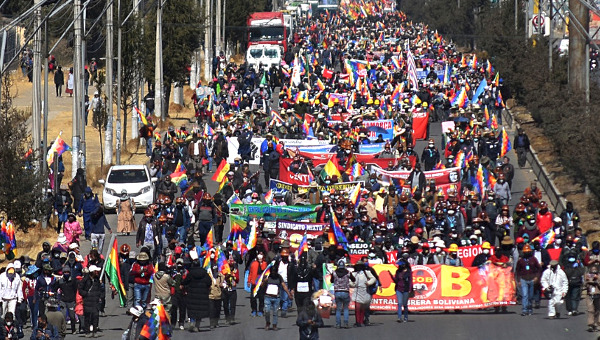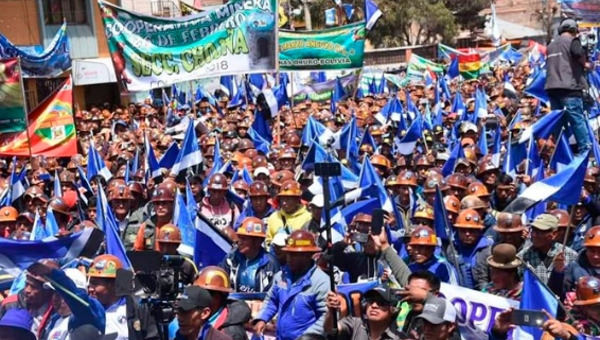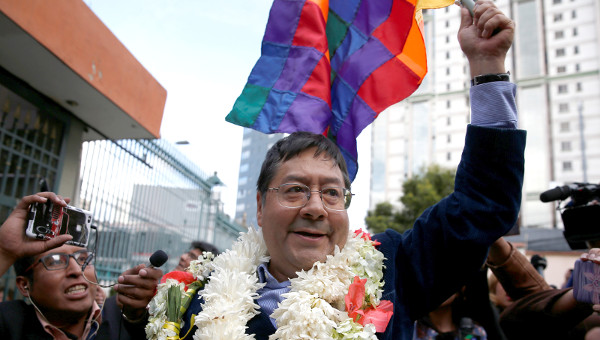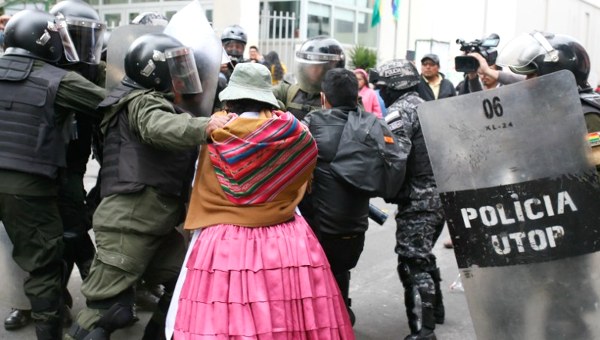The Suspension of Elections in Bolivia and Left Strategy
The small Andean nation hit the news again on October 31 with the announcement that elections originally scheduled for December 2005 are postponed indefinitely. This most recent political crisis has clearly been orchestrated by the agro-industrialist elite from Santa Cruz, who is using procedural rules to thwart the move towards the deepening of democracy. The Santa Cruz elite succeeded in pressuring the Constitutional Court to question the legitimacy of the Presidential elections that were called by the interim government in June 2005 following three weeks of intense conflict. The Constitutional Court ruled that the congressional seats must be reapportioned according to the most recent census results (taken in 2001) in order for the forthcoming Presidential elections to be valid. Since the population has shifted east between 1992 and 2001, eastern zones including Santa Cruz should have more seats to represent the population more accurately.
 The issue regarding electoral seats is so explosive because this 2005 electoral race is so tight. No one complained about this issue during the 2002 elections. But no one knew that Evo Morales, leader of the Movement Towards Socialismo (Moviemento al Socialismo, MAS for short), would come so close to winning until the end. This time, re-allotting seats to the eastern zones will likely mean the re-election of one of the traditional, right-wing parties at the expense of the MAS, which counts higher electoral support in the western parts of the country (see Rios, October 27, 2005, on ZNet for more details on the electoral process). The cruceño elite is afraid that Bolivia may elect an indigenous President, Evo Morales, for the first time in its Republican history.
The issue regarding electoral seats is so explosive because this 2005 electoral race is so tight. No one complained about this issue during the 2002 elections. But no one knew that Evo Morales, leader of the Movement Towards Socialismo (Moviemento al Socialismo, MAS for short), would come so close to winning until the end. This time, re-allotting seats to the eastern zones will likely mean the re-election of one of the traditional, right-wing parties at the expense of the MAS, which counts higher electoral support in the western parts of the country (see Rios, October 27, 2005, on ZNet for more details on the electoral process). The cruceño elite is afraid that Bolivia may elect an indigenous President, Evo Morales, for the first time in its Republican history.
The decision of whether to condemn the cancellation of elections and support the MAS in its struggle against the Bolivian oligarchy brings up two classic, inter-related questions for Canadian socialists: (1) what is the ideal relationship between social movement and political party; and (2) what is the role of the Canadian left in this struggle?
The question of support for the MAS in their bid for office must be understood from the perspective of the popular movements. It deserves mention that the call for elections following the “Second Gas War” of May-June 2005 was primarily seen by social movements as an elite strategy to demobilize the protests that threatened to destabilize Bolivia. The electoral route intended to shove social movement demands back into hallowed halls of the legislature, where the right has always had a distinct advantage (Webber, Monthly Review, September 2005).
The MAS: Limits and Possibilities
Most factions of the Bolivian left currently support the MAS in its bid for office, but with caution and for strategic purposes. Evo Morales is often seen as the least of three evils. The two other competitors in the electoral race are Jorge “Tuto” Quiroga, who is trying to capitalize on his brief experience as President when he replaced former dictator Hugo Banzer in 2002, and Samuel Dorio Medina, owner of Burger King and the largest cement company in Bolivia. Both are clearly allied with the interests of transnational capital and have made public statements about making Bolivia safe for democracy, which, in local parlance, means cracking down on protests.
Even though the MAS is the most appealing choice amongst the available options, what remains important is for progressive social movements to maintain a critical distance from the party. There are positive signs that leading social movement organizations have not rushed to embrace the MAS. In July of this year, Abel Mamani of the FEJUVE-El Alto explored the possibility of forming another political party with the help of other social movement leaders from miners´ unions and the CSUTB (Quispe faction), among others. The proposed platform of the new “political instrument” included the immediate convocation of a Constituent’s Assembly that aims to redefine the nation to meet demands for indigenous autonomy, land distribution, and the nationalization among other areas of social, political and economic reform. At the meeting, these social movement leaders stressed the necessity of creating a “real” political alternative given the MAS’s failure to follow through on these central popular demands since the Gas War of October 2003.
Maintaining critical distance from the MAS is necessary to avoid the repetition of a Lula-like scenario in Brazil, where former party activists on the Left are now faced with the double task of re-building their social movements and a political party. Party insiders in Bolivia report that over the past few years, the MAS is following a similar path to the PT, slowly transforming from a social movement party towards an electoral machine geared solely geared towards the election of Evo as President. Its repeated failure to embrace popular demands and endorsement of neoliberal leaders, such as former President Mesa and temporary President Eduardo Rodriguez, are testament to the gulf that exists between progressive social movements and the party.
Social movement leaders realize that other attempts to form alternative electoral alliances on the left are necessary but such attempts have failed to come to fruition, and reflect the short-term thinking of many of the social movement leaders in Bolivia. Jaime Solares, leader of the Bolivian Workers´ Central attempted to strike a deal with Felipe Quispe, leader of the political party MIP and of a faction of the campesino workers´ union, CSUTB. Quispe rejected Solares´s offer in mid-October. Quispe is not a force to be reckoned with this election, as he only scored 2.8% in recent poll only counting the region of La Paz (compared to about 6% of the national vote in the 2002 Presidential election). The nomination of Alvaro García Linera as Vice Presidential candidate put a wrench in the FEJUVE´s plans to form a new political instrument, as they were previously courting García Linera to be a part of their movement.
The appointment of García Linera as Vice Presidential candidate is largely to thank for the MAS´s recent jump in popularity polls. He is seen to appease both urban, middle class sentiments (being white, a media star, and a well-spoken academic) and the rural-urban, popular left, given his history of radicalism. Since his nomination, García Linera has been busy distancing himself from his radical roots, however. A former guerrilla who spent time in jail for his political activities, García Linera has also written extensively on Marxist theory and social movements in Bolivia. On the question of socialism, however, he has worked hard to convince the electorate that he will never mention this word again.
It should not be a surprise that García Linera winces at the mere mention of socialism, since the MAS never has been and never will be a socialist party, the name being borrowed from a fascist party that died in the 1950s. Its most important social base remains the coca growers in the semi-tropical region of Cochabamba. The only coherent economic policy that the party has ever had is its anti-imperialist stance to fight U.S. plans for coca eradication in the region. Although lucrative for growers in semi-tropical regions in the departments of Cochabamba and La Paz, the policy of growing coca does not amount to a sound policy for the majority of the country’s population.
Thus far in the election campaign, MAS leaders have offered confused and conflicting statements on their vision for the Bolivian economy. In September, Evo Morales and García Linera made no mention of cancelling petroleum contracts (Andrés Soliz Rada, Opinión, September 4, 2005). They later appeared to change their tune in announcing their support for “nationalization” and the “recuperation of natural resources” through the formulation of the Constituents´ Assembly (Opinión, October 13, 2005). Coming from Evo, however, it is likely that “nationalization” does not mean expropriation of the transnational gas companies. It is often seen to only mean reformulating the constitution so that Bolivia “owns” the gas both above and underground (currently the Bolivian state has property rights over the latter). The most coherent platform on offer has been described by one commentator as a collaborative program with the big business, landowners, and transnationals in the name of “reinventing democracy” and “Andean capitalism” (LOR-CI, Rebelión, October 1, 2005).
Strategic Solidarity with the MAS:
Best and Worst Case Scenarios
The left should support the MAS in its bid for electoral power for the reason that it is an anti-imperialist party striving for national autonomy. It should do so with great caution, however, keeping the other foot firmly in the camp of the popular movements, such as the FEJUVE of El Alto and the campesino unions that have kept their distance from the MAS. As James Petras others have observed with respect to Bolivia, the only way to achieve a more just society in the long term is to build strong mass movements from the bottom up that are willing to take state power. At best, the election of the MAS may provide some space for building these movements. At worst, it could serve to disarticulate these movements if the party fails to follow through on any political pacts that are formed once in office.
Pressures for the consolidation of the Left may come from the outside in the event that the current crisis is overcome and the MAS assumes office. As always, the U.S. is making military plans for protecting its backyard, having identified Evo Morales and his party as a member of the “Axis of Evil.” In the spring of 2005, the U.S. began construction of a new military base in Paraguay located about 200 km from the gasfields in southeastern Bolivia. A U.S. sponsored coup like what happened in Venezuela is a distinct possibility. Sponsoring a coup would be a risky strategy on the part of the U.S., however, since it could easily backfire as it did in Venezuela, where the left consolidated after the coup and Chávez made a sharp turn towards the Bolivarian version of socialism.
Unlike Venezuela, Bolivia has very little room to manoeuvre given its deep dependence on international aid. While the country has the second largest natural gas reserves on the continent, it will take time and money to build the state’s capacity to use this resource in such a way that redistributes a portion of the nation’s wealth. Unfortunately, there is no national debate on what a new gas company should look like and how to avoid creating a corrupt, technocratic company like the former public gas company even if the dream for nationalization is realized. The expropriation of more than 20 transnational gas companies operating in the country will involve the Bolivian state in lengthy and expensive lawsuits of the sort brought by U.S. based Bechtel for the cancellation of a water privatization contract in Cochabamba. This case is still before the International Court for the Settlement of Investment Disputes, a World Bank-sponsored agency and may cost Bolivian citizens $25-million.
In the absence of oil to lubricate the implementation of redistributionist policies, it will also be much easier for the IMF and World Bank to push the Bolivian government to continue with austerity programs. Given the fact that Bolivia sold off its productive resources in one of the most disastrous privatization programs on the continent, the World Bank loans pay a large portion of the government’s salaries. Bolivia’s economic position is even worse than even Ecuador, where Lucio Gutierrez was recently deposed by protestors for his failure to follow through with election promises. If elected, the MAS will be squeezed between the demands of popular movements for redistribution and those of the international investors who want their loans paid back.
In Bolivia’s favour, however, is the fact that the left is much more autonomous from political parties than in either Ecuador (the CONAIE) or Brazil (Workers´ Party). As of yet, key social movements have not been co-opted by the MAS. There is a firm resolve amongst the leading social movements that they will settle for nothing less than nationalization of strategic resources.
Role for the Canadian Left?
Insofar as the MAS is an anti-imperialist party fighting for economic dependence, it deserves support from the international Left. The MAS, however, must also be taken for what it is and what it has become: a far from democratic political party that appears to be more interested in gaining power than pushing for profound social change that is largely alienated from popular movements. While the cancellation of the December 2005 is clearly not a progressive and promises to engulf the country in deeper crisis, it might also provide time for social movements to regroup, re-strategize and create a true political alternative.
Upon the announcement that elections were suspended, the FEJUVE-El Alto called for the revival of protests to press for the immediate convocation of the Constituent Assembly. Progressives in solidarity with Bolivian social movements ought to prioritize this call for a Constituent Assembly, because it may have a better possibility of achieving profound social change than merely changing the politicians in the legislature. •
Ex-President Sánchez de Lozada receives
surprise visit at Princeton University
Close to second anniversary of the tragic events of the Bolivian “Gas War”, former Bolivian President Gonzalo Sánchez de Lozada was served his imputation notice to return to Bolivia to give testimony in the case against him. Known as “Goni”, “The Gringo,” or “The Butcher”, Sánchez de Lozada has been in exile in the U.S. since he fled the country on October 17, 2003. Requests for his extradition have thus far been refused. Bolivian citizens and international supporters are lobbying to have Goni returned to Bolivia to stand trial for ordering the murder of civilians during peaceful protests in October 2003. The documents were hand delivered on November 1 by activists at a wine and cheese held at Princeton University.
For more information in English, see http://juiciogoniya.free.fr/inicio/rubrique.php3?id_rubrique=5





